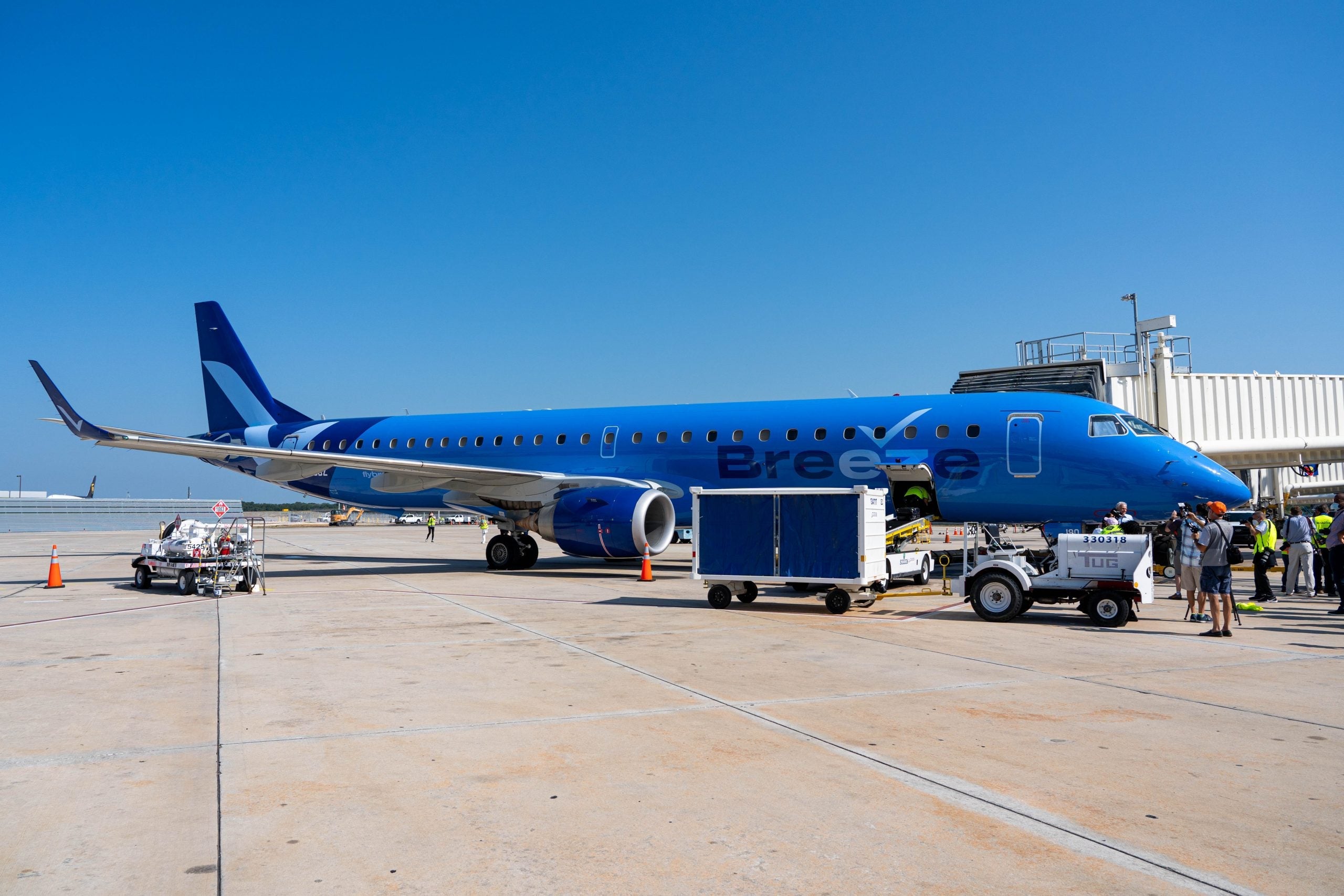Breeze trims New Orleans flights as delta variant and Hurricane Ida slash demand
Breeze Airways made its first permanent route cut this week, and reduced frequencies of several other routes, just three months after the airline began flying passengers.
The cuts, which follow several temporary reductions the airline made in July, were first noticed by Twitter user @IshrionA.
Most of the affected flights are out of New Orleans (MSY), one of Breeze's four focus cities, although the airline also reduced frequencies on several flights out of Tampa (TPA), another focus city.
The airline's first permanent route cut will come Sept. 5, when it will stop flying between New Orleans and Huntsville, Alabama (HSV).
Additionally, Breeze will also reduce frequencies on the following routes, dropping from four weekly flights to two:
- New Orleans-Oklahoma City (OKC)
- New Orleans-Bentonville, Arkansas (XNA)
- New Orleans-Tulsa (TUL)

The following point-to-point routes are reduced from three weekly flights to two, aside from during weeks with major holidays this fall and winter:
- Tampa-Oklahoma City
- Tampa-Tulsa
A spokesperson for Breeze confirmed the cuts, noting that they were made in response to decreased bookings due to the delta variant and rise in covid cases, as well as the impact of Hurricane Ida in the New Orleans market.
Breeze, which was previously known by its codename, "Moxy," was first announced by JetBlue founder David Neeleman in 2018. The airline began service in May 2021 following several months of delays.
The carrier was launched with a plan to focus on point-to-point routes between small, underserved cities. Eschewing hubs, and generally avoiding competition, Neeleman — who also founded Brazilian airline Azul and was previously a co-owner of TAP Portugal — has said the idea is to run a low-cost, nimble operation connecting city pairs that might not come top of mind.
Neeleman has previously suggested that this nimbleness would allow Breeze to rapidly adjust its schedule and try new routes based on demand and booking trends.
The downside, of course, is that passengers booking far ahead of time could see their flights changed or even canceled.
TPG featured card
at Capital One's secure site
Terms & restrictions apply. See rates & fees.
| 5X miles | Earn 5X miles on hotels, vacation rentals and rental cars booked through Capital One Travel |
| 2X miles | Earn unlimited 2X miles on every purchase, every day |
Pros
- Stellar welcome offer of 75,000 miles after spending $4,000 on purchases in the first three months from account opening. Plus, a $250 Capital One Travel credit to use in your first cardholder year upon account opening.
- You'll earn 2 miles per dollar on every purchase, which means you won't have to worry about memorizing bonus categories
- Rewards are versatile and can be redeemed for a statement credit or transferred to Capital One’s transfer partners
Cons
- Highest bonus-earning categories only on travel booked via Capital One Travel
- LIMITED-TIME OFFER: Enjoy $250 to use on Capital One Travel in your first cardholder year, plus earn 75,000 bonus miles once you spend $4,000 on purchases within the first 3 months from account opening - that’s equal to $1,000 in travel
- Earn unlimited 2X miles on every purchase, every day
- Earn 5X miles on hotels, vacation rentals and rental cars booked through Capital One Travel
- Miles won't expire for the life of the account and there's no limit to how many you can earn
- Receive up to a $120 credit for Global Entry or TSA PreCheck®
- Use your miles to get reimbursed for any travel purchase—or redeem by booking a trip through Capital One Travel
- Enjoy a $50 experience credit and other premium benefits with every hotel and vacation rental booked from the Lifestyle Collection
- Transfer your miles to your choice of 15+ travel loyalty programs
- Top rated mobile app


